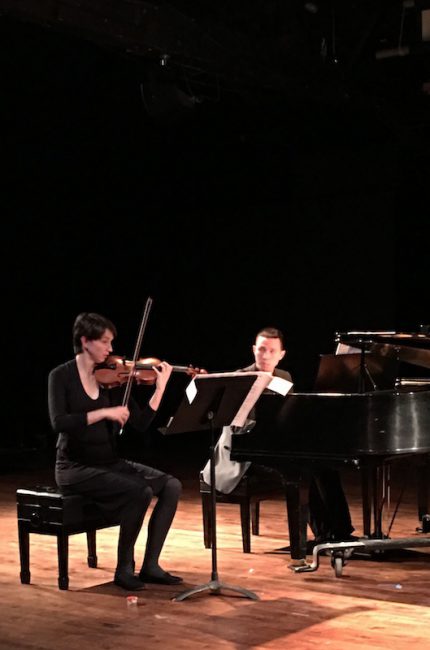Feldman’s spare, searching music illuminates a frigid night

For all of the enterprising new-music groups in Chicago, there remain vast swathes of envelope-pushing American composers of the past whose works remain locally neglected.
Among them is Morton Feldman, the Brooklyn-born composer who died at age 61 in 1987. The cigar-chomping iconoclast wrote works that are famous for their extended duration, yet his music is as quiet and lean as the man himself was big and boisterous.
But things are looking up for Feldman’s legacy in Chicago. The Spektral Quartet will present the belated local premiere of Feldman’s six-hour String Quartet No. 2 on March 11 at the Museum of Contemporary Art. And on a frigid Sunday night, the Morton Feldman Chamber Players performed the composer’s For John Cage at Constellation.
Founded in Boston in 2014, the Feldman Chamber Players have recently relocated to Chicago. That’s good news since that can only help raise Feldman’s profile on the local scene.
By the standard of Feldman’s infamous Second Quartet, For John Cage is a work of Webern-like brevity at just under 80 minutes. Written in 1982 and scored for violin and piano, it is dedicated to Feldman’s fellow musical pioneer, a close friend despite the fact that Feldman’s reserved music was light years removed from Cage’s more anarchic style.
For John Cage is representative of Feldman’s chamber works. A seesawing two-note fragment is softly played by the piano and echoed in the violin. Single notes are added and taken away as the instrumentalists continue, occasionally playing their small phrases together but mostly apart, in a gradual, slowly unfolding conversation.
In such spare textures and hushed dynamics, the smallest development seems seismic—a slight bow change, a mezzoforte piano chord, a playful, unison motif, or the single flicker of violin vibrato near the one-hour mark.
Yet as outwardly uneventful as his music is, Feldman holds the listener’s interest in a quiet yet compelling way. We always feel Feldman’s music is going somewhere, leading the ear on to the next minute development in his extended canvas.
The two- and three-note fragments gradually start to lengthen and we reach rising, scalic phrases and a more expressive quality. There is no grand conclusion and the destination is unclear, with the music ending in the middle of that rising figure. Yet the journey feels rewarding and even strangely purifying.
While not virtuosic in the traditional sense, Feldman’s score is intensely demanding for the players, requiring a level of taut concentration and stamina, playing such acutely focused music for 75 minutes without a break.
Pianist Shi An and violinist Myra Hinrichs showed themselves superb interpreters of Feldman’s challenging style. Hinrichs’ violin had a somewhat dry, astringent quality that contrasted nicely with An’s pointillist, luminous piano. Both musicians maintained impressive focus throughout the long, unbroken span, listening closely to each other, attentive to the subtle shifts in dynamics and tempo, and conveying Feldman’s distinctively spare, searching serenity.
Presentation was lacking with a single handout sheet containing background about the ensemble’s cosponsors, Experimental Sound Studio and Iarca Gallery, yet not a word about the piece they were performing. The group’s minimalist website is similarly short on basic information, even as to the group’s membership and future plans and concerts.
Still, the Morton Feldman Chamber Players are clearly inspired advocates for this still-neglected American maverick, and one looks forward to their future events. In an era of microbial attention spans, when people are impatiently clicking to find the next new thing, Feldman’s quiet, stoic music feels almost medicinal.
Posted in Performances





Posted Dec 20, 2016 at 2:26 pm by Tod Verklärung
Bravo to the players and to you, Mr. Johnson, for reporting the event. There is so much extraordinary music that never gets a hearing in our town, especially that which is “verboten” by the terror stricken large institutions. Bravo as well to the Lyric for last season’s Weinberg “Passenger,” Northwestern University for its simultaneous concert performance of a Weinberg symphony, and the other brave organizations that choose to champion worthy works and present them. And to the audience that supports their endeavors by their attendance and contributions.